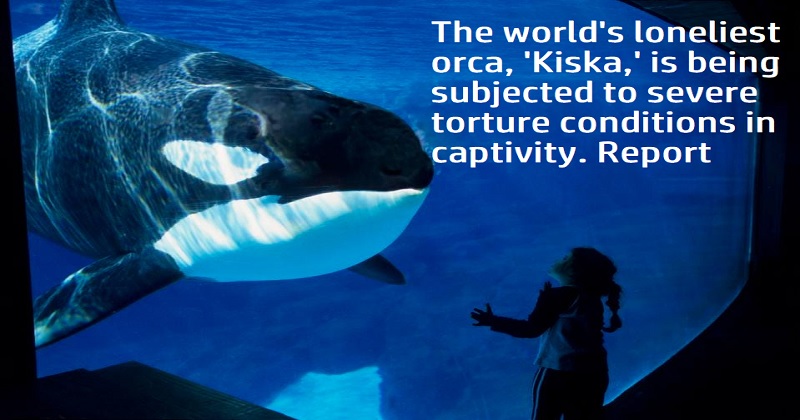
The world’s loneliest orca whale has been imprisoned in conditions that are ‘tantamount to torture.’ Killer whale ‘Kiska’ has been kept in captivity at MarineLand, a tourist park and zoo in Niagara Falls, Ontario. The aquatic mammal has spent the last 43 years in captivity, and 11 of those years have been spent by itself in its tank, says Newsweek report.
While in captivity, Kiska had five children, but they all succumbed to disease at an early age. One of the calves had a minimum life expectancy of two months, while the calf with the longest life expectancy lived for six years.
Orcas are marine animals also referred to as killer whales. They are the largest members of the dolphin family and are classified in the odontocetes suborder of toothed whales. Since orcas are the most widely scattered of all whales and dolphins and may be found in every ocean, they enjoy enormous popularity.
Although they live far shorter lives in captivity, orcas in the wild have an average lifespan of 30 to 50 years. They are well known for their black and white colouring, but depending on where they live, they have a wide range of appearances, behaviours, communication patterns, and diets.
Orcas are renowned for their sharp minds and convoluted social structures. They possess one of the most developed and substantial brains in the animal kingdom.
They also fall under the third most prevalent species of cetaceans, a group of aquatic creatures that includes whales, dolphins, and porpoises housed in aquariums and marine theme parks worldwide, says a 2019 study that was published in the Journal of Veterinary Behavior. The study examined the drawbacks of keeping these animals in captivity.
The creator of the Whale Sanctuary Project and one of the study’s authors, Lori Marino, was described by Newsweek as saying that while there are ‘huge’ individual differences in how each whale manages spending years in a concrete tank, ‘none can flourish.’

Post Your Comments